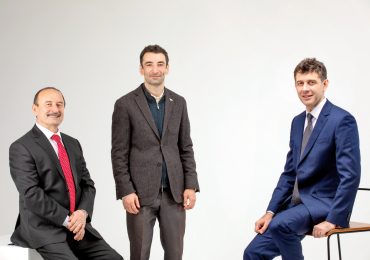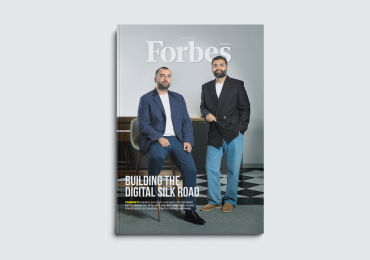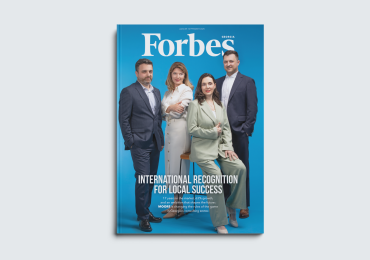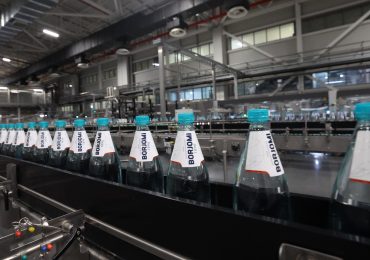The co-founders of the startup Datamind, Rati Kunchulia and Vakho Burchuladze-Kalandadze, have captured almost 70% of the banking sector in Georgia with their universal data integration engine. Today, they are preparing to launch a new product, Data Unistream, which will make data-driven decision-making easier for companies across any industry on a global scale.
“Data is a superpower, and we believe this power should be accessible to every organization, regardless of its size or IT budget,” says Vakho Burchuladze-Kalandadze. The startup he and Rati Kunchulia founded has been pursuing this idea for four years. Thanks to a technological breakthrough in the field of data management, Datamind was valued at $2.2 million just seven months after its founding, making it one of the most promising startups in Georgia. The team has raised $700,000 in investment, and the long list of Georgian and foreign clients suggests that Datamind knows something about data that sets it apart from its competitors.
The story of Datamind began in 2021 when Rati Kunchulia and Vakho Burchuladze-Kalandadze decided to offer a simple and relatively affordable solution to the challenges of data analysis for the Georgian financial sector. At that time, every bank was dealing with large volumes of data, but because creating a centralized data warehouse required enormous resources and time, this data was often left unused. Vakho recalls that while working at a bank, he frequently witnessed how the process of obtaining specific data could drag on for months. He also knew that “if there was a properly placed and categorized database, obtaining this information could take milliseconds instead of months.”
Vakho is a finance professional. His career began in the insurance sector, where he worked as a reporting and control manager before heading the data administration department. In 2016, he transitioned into the banking industry. According to him, most financial professionals only used Microsoft Excel for data processing at that time. Even before artificial intelligence became a global topic, Vakho understood that data is the most valuable asset for a company. That is why he started educating himself in the field. He met Rati Kunchulia while working at a bank. By then, Rati had already gained impressive experience working as a data architect at Georgia’s largest banks. Additionally, he worked for organizations such as Toptal, FAO, Wandio, Singular, and Yara International. Rati and Vakho were united by a shared enthusiasm for data. They quickly realized that their unique advantage was their ability to view data from both a technological and business perspective. Shortly after this realization, they transitioned from the corporate world to the startup ecosystem and began building Datamind.
Rati is convinced that stepping out of one’s comfort zone is an essential step in the startup development journey: “If you give yourself a way out and don’t take risks, it will affect your attitude, and you won’t succeed.” Vakho adds that, for the idea, the founders not only gave up guaranteed income, both present and future, but also put at risk the wealth they had accumulated over 10-12 years of hard work: “We mortgaged everything for the initial investment so that, in case of delays in funding, we could still pay one more month of salaries.”
The startup began its operations in a small office with five people and grew at a dizzying pace. One of the pivotal moments was when Vakho and Rati secured funding from a Georgian network of angel investors, Axel. This was the first time the entrepreneurs experienced the pitching process and interacted with investors. “Vakho filled out the application form at 2 PM, and by 4 PM, they called us and said the session was scheduled in an hour. They suggested it might be reasonable to postpone the presentation for the next month,” they recall. The founders agreed that waiting would be logical, but in the end, they could not sit still and, within an hour, presented a hastily assembled pitch to investors. Sincerity, confidence, and a passion for their work turned out to be an effective combination, and Datamind won the hearts and minds of the investors. The managing director of Axel, Iro Tsagareishvili, attributes the significant interest from investors in Datamind to its strong and qualified team. “The experience Rati, Vakho, and their team members had, their in-depth knowledge of the industry, and a detailed understanding of sectoral challenges were the factors that most impressed our angel investors,” explains Iro. According to him, the assessment from Axel members was that “these guys will definitely succeed in something.” Just two days after the presentation, an investment agreement was signed.

The effectiveness of Datamind’s technology is based on several key elements. With the help of unprecedented data compression, 10 terabytes of data can be reduced to just 0.5 terabytes (a 95% reduction), and through ultra-fast integration, linking and harmonizing data takes only one hour instead of weeks or months. This automatically reduces both the implementation timeline and the costs of data storage. For smaller financial institutions, which often lack the budget for expensive technological experiments, Datamind provides an accessible and rapid solution.
Datamind’s operational specifics involve access to sensitive information and personal data. Both Vakho and Rati treat the security guarantees given to partners and the company’s reputation with the utmost seriousness. “We often offer clients security standards they may not even have thought of themselves,” says Vakho. To ensure that the company’s work standards align with the best international practices, Datamind developed an internal information security policy (GDPR policy) and security systems in collaboration with one of the “Big Four” auditing firms.
After penetrating the Georgian banking sector, Vakho and Rati began thinking about their next steps. This period coincided with Datamind’s partnership with Paysera International, a significant player in the global fintech market. Datamind gained experience in the European market and validation from a large client operating to the highest standards.
“Working with Paysera showed us that if such an organization needed our expertise, it meant we could truly scale our product,” says Vakho. As a result, Datamind decided to move away from offering services to companies and focus on creating a tool that companies could use independently, without requiring specialized technical knowledge.
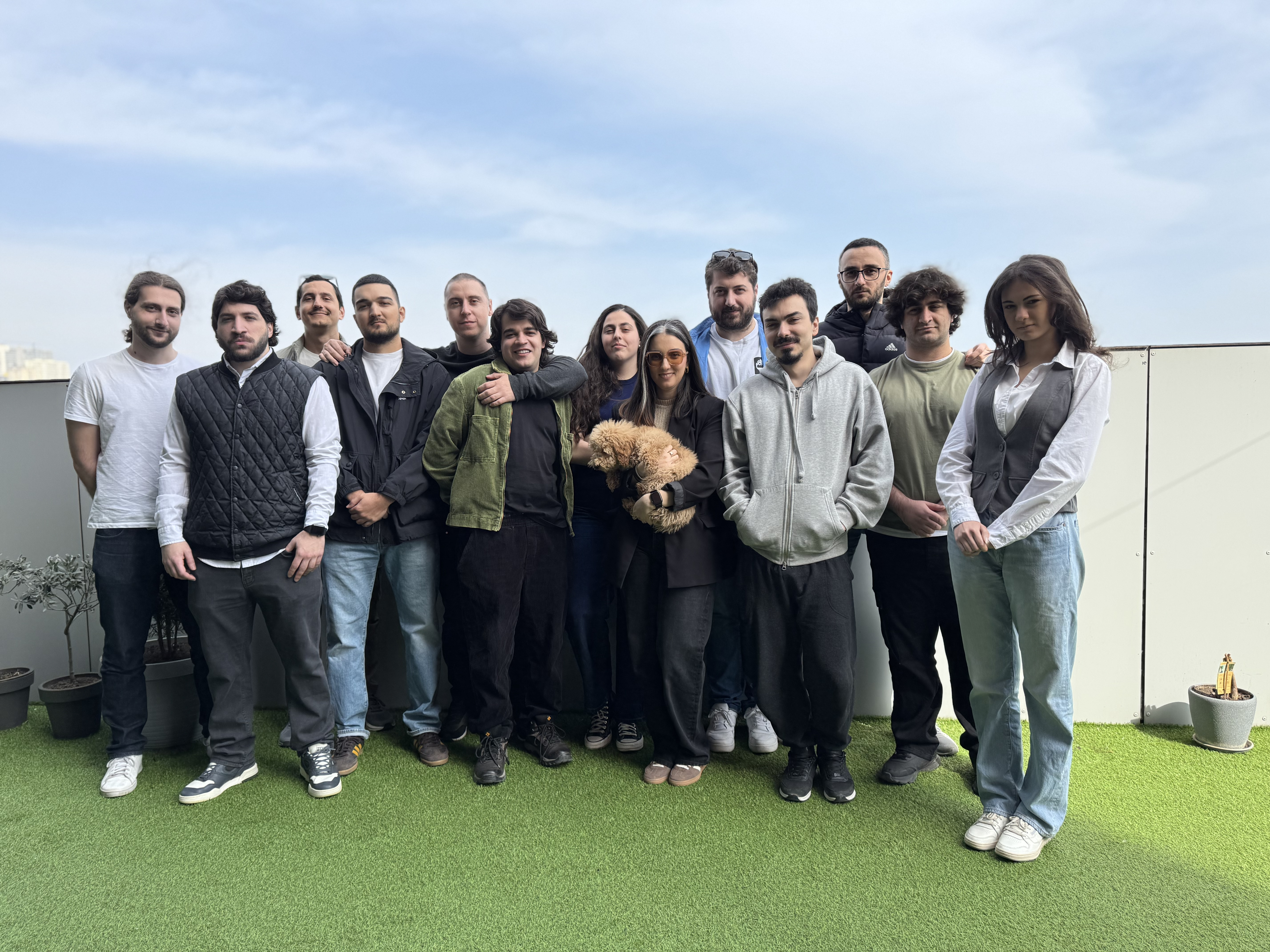
About a month ago, the Datamind team tested their product for the first time. “In that moment, everyone held their breath for two minutes. We did not know if we were ready to bring the product into the light of day or if we had another year of work ahead of us,” Rati emotionally recalls the episode. The result exceeded expectations. As the founders of Datamind say, the new tool, Data Unistream, solves every data-related problem at lightning speed. The product includes an AI model with real-time access to company data and can perform tasks like data analysis, report generation, trend forecasting, and more.
What sets Data Unistream apart from international competitors is the combination of accessibility and simplicity. While corporate solutions like Snowflake and Google BigQuery have impressive functionality, using them requires specific technical knowledge. Visualization tools like Tableau and Power BI, on the other hand, do not address data management problems. Data Unistream combines multiple tools in one platform, which companies traditionally would have implemented in separate systems. It includes a data warehouse, business analytics tools, data governance mechanisms, and an AI assistant. Additionally, it incorporates stringent privacy protection standards and a zero data retention policy (ZDR). This integrated approach significantly speeds up the process of making data-driven decisions.
Data democratization has been the core idea driving Datamind since its inception. Rati notes that their goal has never been to create expensive tools for only a few select companies but to make their product available to as many companies as possible. According to their current strategy, the Datamind team plans to attract up to 150 new clients from various industries by 2027. Rati and Vakho are particularly interested in the Baltic region.
“One of our advantages is that we understand the needs of both large and medium-sized businesses,” explains Vakho. The company has a tiered pricing system that gives smaller organizations the same data capabilities as large corporations.
“By 2030, we will have such a refined product that we won’t just adapt to the current rules of the game, but we will set the standards ourselves in the realm of data,” Rati confidently states. This strategy also includes developing their own AI models, which integrate Georgian elements from the outset (including Georgian names). According to Datamind’s founders, with the arrival of the AI era, it is crucial that Georgian companies do not pay enormous sums to foreign firms for AI services; instead, Georgia should become an exporter of AI-based products and services.
Datamind operates in a fascinating space where three of the world’s largest technological trends intersect: the growing need for data integration across various systems, the use of artificial intelligence for business analytics, and digital security. Datamind’s unique ability to address existing gaps in the market with innovative approaches and respond to multiple challenges with a unified, comprehensive solution provides a foundation for optimism. In an unpredictable world, where the pace of technological development reaches previously unimaginable heights, data remains the only reliable compass.
“The next five years will be transformative in terms of data management,” Vakho says. “We’re creating tools that will allow organizations of any size to keep up with these processes. The main mission is to turn the story of local success into international success.”









